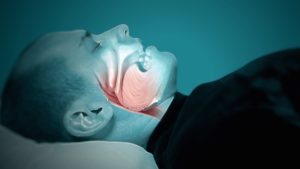Signs That Your Fatigue May Be Caused By Sleep Apnea
Sleep apnea is a chronic condition that occurs when your muscles relax during sleep, allowing soft tissue to collapse and block the airway. As a result, repeated breathing pauses occur, which often reduce oxygen levels. These breathing pauses are followed by brief awakenings that disturb sleep. While a sleep study is the best way to diagnose sleep apnea, there are certain observations in the mouth that indicate possible sleep apnea. If you struggle with fatigue, find out if sleep apnea could be affecting you.

Signs That Your Fatigue May Be Caused By Sleep Apnea
While we mostly think of the mouth as a means to eat, drink, and speak, the mouth can offer great insight to our overall health. The mouth can even provide signs of sleep conditions such as sleep apnea.
Sleep apnea is a chronic condition that occurs when your muscles relax during sleep, allowing soft tissue to collapse and block the airway. As a result, repeated breathing pauses occur, which often reduce your oxygen levels. These breathing pauses are followed by brief awakenings that disturb your sleep.
Sleep apnea is a common condition, but most people with sleep apnea are undiagnosed. It’s estimated that 20–30% of the population has this condition, but 90% of these people have not been diagnosed.
SIGNS AND SYMPTOMS
Common signs of sleep apnea include snoring and gasping or choking sounds during sleep. Like snoring, sleep apnea is more common in men, but it can occur in women too, especially during and after menopause. Having excess body weight, a narrow airway or misaligned jaw all increase the risk of sleep apnea.
Other signs and symptoms include
- Daytime fatigue
- Bruxism (teeth grinding)
- Adrenal insufficiency
- Hypothyroid
- Lingual erosions (GERD)
- Morning headaches
- Neck aches
- Cracks in teeth
- Daytime sleep latency
While a sleep study is the best way to diagnose sleep apnea, there are certain observations in the mouth that indicate possible sleep apnea.
Signs of sleep apnea observed in the mouth
- Sleep bruxism — excessive teeth grinding or jaw clenching
- Lingual erosions — stomach acid in the mouth eating away at the teeth (GERD)
- Shape of tongue — scalloping or fissuring of the tongue
Signs in children
- Narrow arches
- Mouth breathing
The quality of your sleep has a dramatic impact on your health, well-being and overall quality of life. Snoring and obstructive sleep apnea disrupt your sleep and increase your risk of severe health problems.
Your sleep impacts every aspect of your health and daily life. Sleeping well helps you look, feel and perform your best. But a sleep problem can be harmful to your health and well-being. One of the most common sleep problems is sleep apnea.
Here are a few things you can evaluate about the quality of your sleep.
- Do you have any recollection of things that happen in the night? Sleep should be amnesic. You should fall asleep at night and wake the next morning without remembering anything.
- Do you feel tired after lunch?
- Can you watch a movie without falling asleep?
- Can you read a couple chapters in a book without falling asleep?
- Do you snore at night and move around a lot?
We now have access to wonderful apps to help you monitor your sleep. This is a great place to start. The app recommended by Dr. Mark Burhenne, sleep medicine dentist, is called Sleep Analyze.
TREATMENT
Treatment options include continuous positive airway pressure (CPAP) therapy, oral appliance therapy, and surgery.
The most common treatment for sleep apnea is continuous positive airway pressure (CPAP) therapy. The CPAP machine keeps your airway open by providing forced air through flexible tubing. CPAP therapy requires you to wear a mask as you sleep. Although CPAP therapy is effective, some people are unable to adhere to it. Your doctor should consider giving you a prescription for a sleep apnea appliance if you are unable to tolerate CPAP therapy or prefer an alternate treatment. Many people like an oral appliance because it is comfortable, quiet, portable and easy to wear. In some severe cases of sleep apnea, upper airway surgery may be another treatment option.
- CPAP therapy involves wearing a face mask connected by tubing to a constantly running machine.
- Oral appliance therapy uses a mouth guard-like device — worn only during sleep — to maintain an open, unobstructed airway.
- Surgical options include a variety of procedures. All have varying side effects and rates of success.
Treating obstructive sleep apnea is incredibly important to your health. When left untreated, sleep apnea often causes excessive daytime sleepiness or fatigue, as well as morning headaches and memory loss. Sleep apnea also is a threat to your safety, as it increases your risk of drowsy driving and workplace accidents. Untreated sleep apnea raises your risk for serious health problems. These include:
- High blood pressure
- Stroke
- Heart disease
- Diabetes
- Chronic acid reflux
- Erectile dysfunction
- In severe cases, death
How can you help yourself if you think you have sleep apnea?
- Read Dr. Mark Burhenne’s new book, The 8-Hour Sleep Paradox: How We Are Sleeping Our Way to Fatigue, Disease and Unhappiness.
- Read about what lack of sleep leads to and make a fair self-assessment.
- Go see your dentist or find a dentist trained in sleep medicine. Visit American Academy of Dental Sleep Medicine.
If you’d like to learn more about sleep apnea and the warning signs, be sure to check out our podcast with Dr. Mark Burhenne.
References
American Academy of Dental Sleep Medicine
Discussion
I care about answering your questions and sharing my knowledge with you. Leave a comment or connect with me on social media asking any health question you may have and I just might incorporate it into our next listener questions podcast episode just for you!